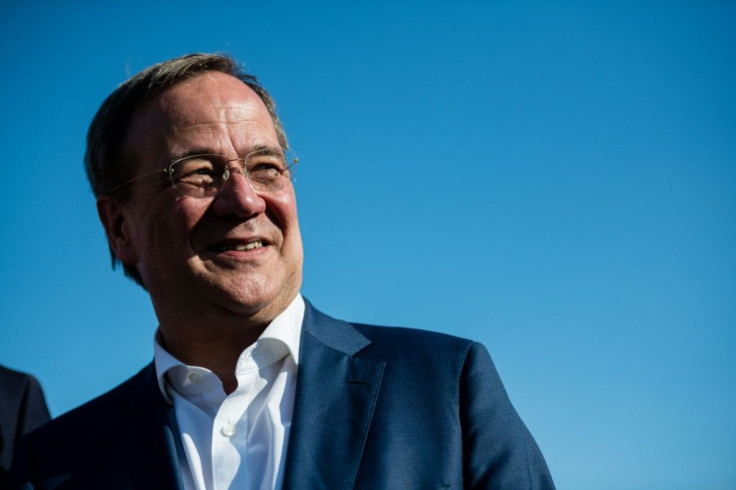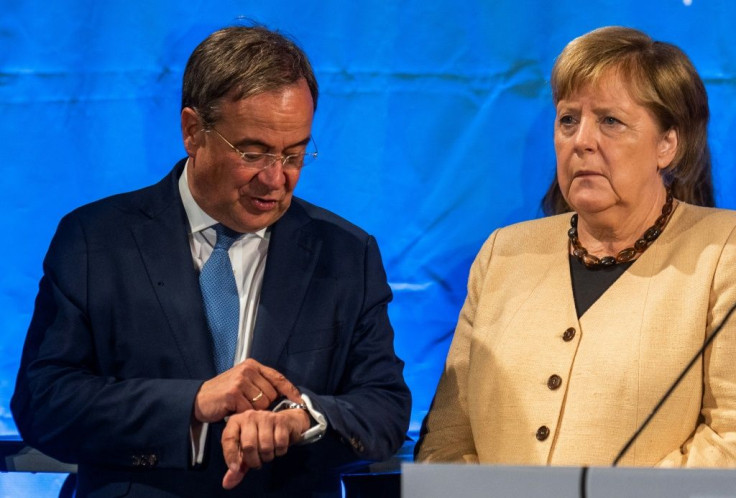Armin Laschet: 'Comeback King' Still Chasing Merkel's Crown
Armin Laschet, the candidate from Angela Merkel's party to succeed her as chancellor, may have had a dismal election campaign marred by gaffes, but he also has a reputation for endurance and digging his heels in.
The affable 60-year-old, who what Der Spiegel magazine has described as an ability to "sit out" his opponents, is doing just that as he stakes his claim to form Germany's next government even as preliminary results from Sunday's vote show his party trailing its rival Social Democratic Party.
Signalling that all was not lost yet, he declared that he would "do everything we can to build a government led by the (conservative) Union".
Elected as head of the CDU in January, Laschet was for some time the clear favourite to succeed Merkel when she bows out of politics after Sunday's election.

But as he committed a series of gaffes on the campaign trail, polls showed the conservative alliance falling behind the SPD.
A particular low point for Laschet came in July, when he was caught on camera laughing during a tribute to the victims of deadly floods in North Rhine-Westphalia, where he is the regional leader.
He has also been widely criticised over his dithering response to the Covid-19 pandemic in that region, with the Sueddeutsche Zeitung newspaper describing him as "indecisive, sometimes acting impulsively".
Even on election day, he was widely ridiculed after voting in his hometown of Aachen when he folded his ballot with his choices visible -- against German election rules.

If Laschet does manage to get his hands on the chancellery, it would not be the first time he has defied expectations.
Laschet won the vote to become CDU leader against the odds, and went on to secure the conservatives' nomination to be chancellor candidate after a drawn-out battle with the more popular Markus Soeder of the CSU.
He also outperformed the polls to secure his impressive 2017 regional election win in North Rhine-Westphalia, Germany's most populous state.

Asked in a recent TV interview whether he thought he was often underestimated, Laschet replied that "many have certainly miscalculated".
A devout Catholic, Laschet was born the son of a coalminer in Aachen, in western Germany near the border with Belgium and the Netherlands.
"When you're down in the mine, it doesn't matter where your colleague comes from, what his religion is or what he looks like. What is important is, can you rely on him," he told party colleagues in January.
Laschet initially studied law in Munich before working as a journalist, including for several years as the editor of a Catholic newspaper.
After first joining the CDU as a teenager, he was elected to the Bundestag German parliament in 1994 and to the European Parliament in 1999.
He became head of the CDU in North Rhine-Westphalia in 2012 and has been state premier there since 2017.
A defender of multiculturalism, Laschet has a reputation for being even more pro-migration than Merkel, and famously backed the chancellor during the fallout from Germany's 2015 refugee influx.
A self-described "passionate European", he is a fluent French speaker and met his wife and the mother of his three children, who is of French-speaking Wallonian origin, singing in a church choir.
Known for his jolly persona, Laschet is a regular at the famous carnival celebrations in North Rhine-Westphalia and was even awarded a "prize against deadly seriousness" by the Aachen carnival club last year.
But he also showed his serious side when responding to the crisis in Afghanistan, accusing NATO of the "biggest debacle" in its history.
Afghanistan gave Laschet "the first opportunity to present himself as a statesman in the making", Die Welt daily said. "This was no longer the friendly Rhinelander."
© Copyright AFP {{Year}}. All rights reserved.





















